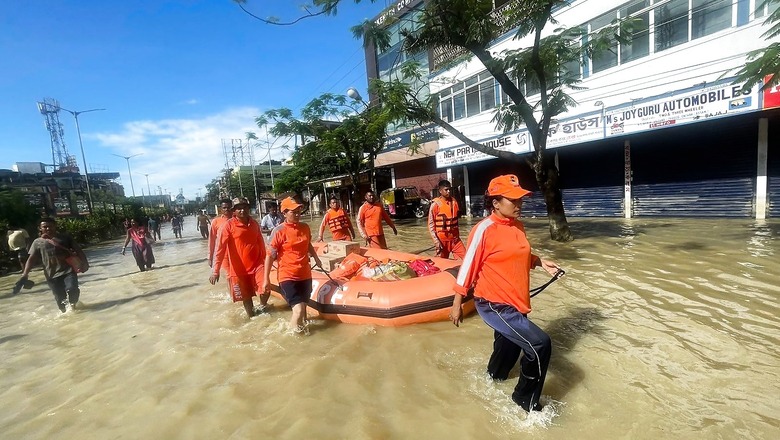
views
The death toll due to this year’s floods rose to 25 after eight fresh fatalities on Tuesday in the worst-hit Cachar district, affecting the lives of over three lakh people. The National Disaster Response Force (NDRF) has deployed intensive rescue operations, risking its own lives to distribute relief and aid to those stranded.
NDRF rescue boats are undertaking continuous flood relief operations including the distribution of drinking water and necessary food items to those affected.
However, distress calls for issues such as intensely polluted water and poisonous snakes entering houses in areas where NDRF boats can’t reach are some of the challenges the personnel are facing. Such situations create barriers to reaching those marooned and providing food, medicines, water and other relief material to the affected.
Speaking to CNN-NEWS-18, Assistant Commandant of NDRF, Arunachal Pradesh Ram Karan Swami said, “The whole town of Silchar is now underwater. We have been attending to every distress call of the people here. But there are challenges for us as well. In some places, there is heavily polluted water that has flooded the locality. It is so polluted that even the smell can cause you disease. But our Jawans are getting down neck-deep to deliver water and food to the people stranded.”
The Assistant Commandant said the Jawans have been climbing buildings to provide relief materials in heavily flooded areas and regions filled with poisonous snakes. “They (stranded people) cannot even come down to the gates to take relief materials. So our Jawans are climbing walls of buildings to provide them with whatever is possible from our end. There are places where there are huge numbers of poisonous snakes. We have witnessed so many, but our Jawans put the cause of the people first and risk everything to help them,” he added.
A resident said they look forward to seeing the personnel and they have been like “gods” to them. “We look forward to this NDRF personnel. They have been like gods to us. We can’t go even to the gates as the water is so poisonous to even walk through it. We tie our bags to a rope and drop the bags from the roof or tin of our houses. They (NDRF) provide us with water bottles and some relief items on which we survive the whole day.
Swami said he has requested the district administration to set up more medical camps now that the rivers are showing a receding trend. “We have told district administration to set up more medical camps here. Because now that the water recedes, there will be a lot of diseases. Even our Jawans who are continuously working in the waters might get severe health hazards. We have told the district administration to set up more camps and responded positively.”
Meanwhile, rivers Kapili, Beki, Barak and Kushiyari have been flowing above danger levels for the past 16 days.
A total of 2,254 villages in 61 revenue circles remain affected by floods. In the last 24 hours, eight people have died including 5 from Cachar and one each in Kamrup Metro, Morigaon and Nagaon.
In Silchar town of Cachar, more than 1,50,000 people are still underwater. Three people have also died due to deluge-triggered landslides in the region. Those marooned are struggling for food and water to survive.
The NDRF, SDRF and the Army are continuously carrying out operations to save the people stranded but are facing difficulty in reaching all locations and meeting the needs of the people.
Read all the Latest News , Breaking News , watch Top Videos and Live TV here.
















Comments
0 comment